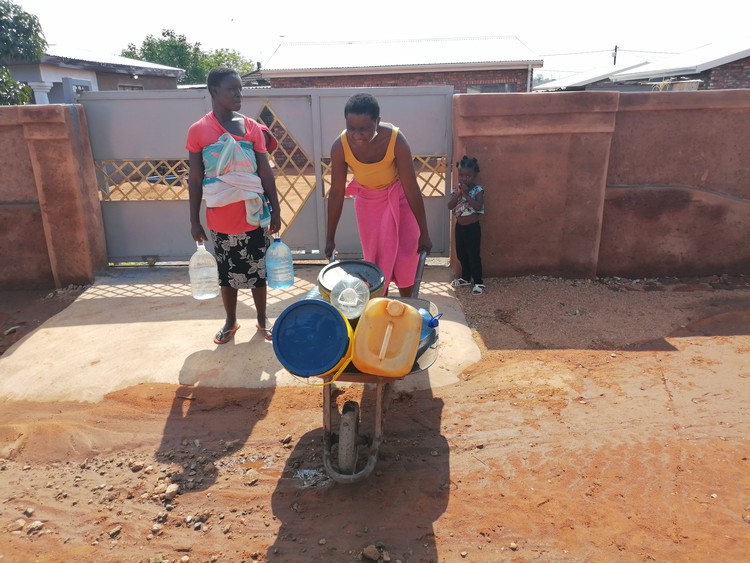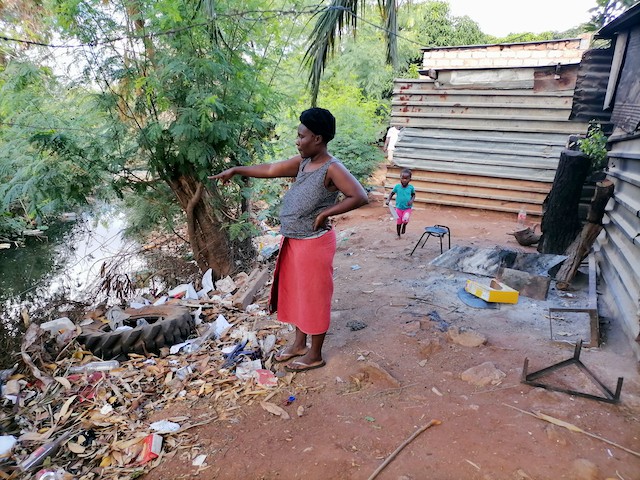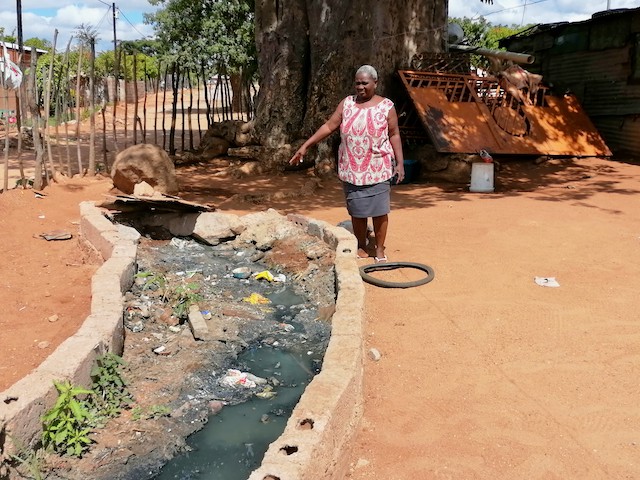Municipality never had a plan for water crisis, says Musina community
Water shortages and sewage problems have dragged on for a decade
In November 2021 we reported how Musina resident Makie Nevhulaudzi had to make two trips a day to collect water several kilometres from her home. Her taps were dry for two weeks. Residents say the water supply remains unreliable to date. Archive photo: Bernard Chiguvare
Sewage flowing above ground while their taps run dry in their homes has become the norm for the people of Musina over the past decade, say residents.
Peter Jack, chairperson of Musina To The Front, a community structure, says that for ten years the Vhembe District Municipality (VDM) has never had a plan to fix the situation.
On 8 March ten community members forced their way into a meeting between the Deputy Minister of Water and Sanitation, Dikeledi Magadzi, and the Musina Local and the VDM at the Musina municipal building.
But Matodzi Ralushai, Vhembe municipality spokesperson, denied having no plan. He did say it had been resolved at the meeting that VDM “develop” an immediate, short and long-term water plan. Ralushai said Musina’s population is growing fast and the municipality is busy upgrading the sewer system and working on boreholes.
Lucy Kobe, Limpopo Department of Water and Sanitation spokesperson, confirmed that Magadzi had visited Musina on a fact finding mission. She allowed residents to join the meeting although they had not been invited.
Kobe said the provincial water and sanitation department is busy finalising action plans to fix Musina’s water and sanitation challenges. She also promised a follow up visit by the deputy minister.
We reported in October 2021, how Musina residents had handed a memo to Mayor Mihloti Muhlope, demanding the municipality fix water outages. At the time more than half of the 36 Musina boreholes were out of order, and water was not available from 9am to 3pm and 8pm to 3am. Currently the community only gets water from 4pm to 7pm.
The district municipality promised that water tankers would supply the affected areas of Campbell, Matswale and Harper townships.
But according to residents, water deliveries have been rare as there is only one tanker for all three townships. They also said the boreholes are still not fixed.
Ralushai did not respond to us when asked how many of the 19 boreholes had been fixed.
Catherine Sebola points to a dam of sewage next to her house. Photos: Bernard Chiguvare
Touring the area with residents, Sewani Kaunda says sewage spills are the norm in Musina’s townships. Resident Catherine Sebola showed us a dam of sewage water and waste that has developed next to her house.
Sebola has been living in Matswale Phase 1 since 2000. We “have already learnt to live with the stinky smell,” she says.
Another resident who lives nearby, Hangwani Mulaudzi, says the municipality came to fix a large burst sewer pipe on 9 March. Within hours it had burst again. The workers hadn’t returned, he said.
At one point, a crocodile made the dam its home. Children spotted it. Officials from the Limpopo Department of Economic Development, Environment and Tourism came and shot it in January.
Emily Baloyi, who lives in Mushongo Villa next to the N1, said the stink of sewage is part of her life. She has even built a gully to channel the sewage away from her yard. The main sewer is blocked and so are the toilets of the surrounding houses.
“We have complained several times to the municipality but no one has come to fix the sewerage. Last year, they promised to fix the sewer but up to now nothing has been done,” she said.
Emily Baloyi of Mushongo Villa had this channel built to direct overflowing sewage away from her yard.
On the weekend, the Democratic Alliance (DA) announced it will lay charges at the South African Human Rights Commission against municipal manager of Vhembe District municipality Sylivia Ndou “for her continued failure to fix the dysfunctional wastewater works in the Musina municipality”.
The DA said residents of Muchongo, Matswale and Nancefield villages and in parts of Musina town are subjected to daily sewage leaks. It said it had reported the issue in October 2020 to the Green Scorpions.
Support independent journalism
Donate using Payfast

Next: Diver accuses Alexkor of more illegal rock dumping
Previous: Marchers demands action against xenophobic attacks
© 2022 GroundUp. This article is licensed under a Creative Commons Attribution-NoDerivatives 4.0 International License.
You may republish this article, so long as you credit the authors and GroundUp, and do not change the text. Please include a link back to the original article.
We put an invisible pixel in the article so that we can count traffic to republishers. All analytics tools are solely on our servers. We do not give our logs to any third party. Logs are deleted after two weeks. We do not use any IP address identifying information except to count regional traffic. We are solely interested in counting hits, not tracking users. If you republish, please do not delete the invisible pixel.



